Political corruption within labor unions was the topic of On the Waterfront, Elia Kazan’s 1954 Oscar-winning picture, which features one of Marlon Brando’s two or three greatest performances.
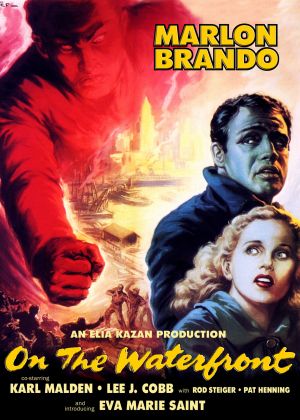
Budd Schulberg prepared the screenplay from his own story, which in turn was based upon a series of newspaper articles by Malcolm Johnson for the New York Sun. Johnson won a Pulitzer Prize in 1949 for this exposé of dockland corruption and labor conditions; Kazan hired him to be an advisor in the making of the film.
Our grade: A- (**** out of *****)
The movie goes beyond its formal subject, serving effectively as an expose of union racketeering and as a thriller involving the murder of an innocent longshoreman.
Shot on location, “On the Waterfront” was photographed in black-and-white, semi- documentary style (Boris Kaufman won an Oscar), which suited its realistic subject matter and commonplace characters. Marlon Brando won Best Actor for one of his most touching and memorable performances as Terry Malloy, an ex-prizefighter who transforms with the assistance of his girl (Eva Marie Saint) and the neighborhood’s priest (Karl Malden) from a passive dock worker into an a crusader fighter against trade unions tyranny.
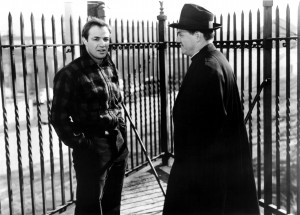 “On the Waterfront” brought Oscars to director Kazan, supporting actress Saint, story and screenplay to Budd Schulberg, art direction, and editing. The only categories in which the movie lost were Scoring of a Dramatic or Comedy Picture (Leonard Bernstein) and the supporting actor, probably because three male roles were nominated within the same league. Rod Steiger was nominated for playing Brando’s brother, an opportunistic lawyer working for the arrogant racketeer boss, played by Lee J. Cobb, who was also nominated. Karl Malden, who had previously won for “A Streetcar Named Desire,” was also nominated for playing a militant yet sympathetic Father Barry.
“On the Waterfront” brought Oscars to director Kazan, supporting actress Saint, story and screenplay to Budd Schulberg, art direction, and editing. The only categories in which the movie lost were Scoring of a Dramatic or Comedy Picture (Leonard Bernstein) and the supporting actor, probably because three male roles were nominated within the same league. Rod Steiger was nominated for playing Brando’s brother, an opportunistic lawyer working for the arrogant racketeer boss, played by Lee J. Cobb, who was also nominated. Karl Malden, who had previously won for “A Streetcar Named Desire,” was also nominated for playing a militant yet sympathetic Father Barry.
Much has been written about Kazan as a friendly witness testifying before the HUAC, in which he repudiated his leftist past and named names. The movie itself has been interpreted as a “McCarthy film,” one that favors informing, though the analogy between informing on Communists and informing on corrupt crooks is problematic.
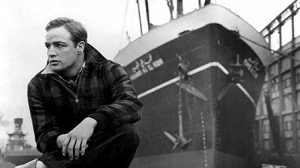 Nonetheless, “On the Waterfront” is a powerful and enjoyable film even without this ideological reading. And the picture would have won the Oscars regardless of its politics considering the weak Best Picture competition that year.
Nonetheless, “On the Waterfront” is a powerful and enjoyable film even without this ideological reading. And the picture would have won the Oscars regardless of its politics considering the weak Best Picture competition that year.
Read about another political Oscar winner: All the King’s Men
https://emanuellevy.com/wp-admin/post.php?post=112690&action=edit
Detailed Plot of On the Waterfront
Corrupt union boss Johnny Friendly (Lee J. Cobb) boasts about his control of the waterfront. The police and the Waterfront Crime Commission know that Friendly is behind a some murders, but witnesses fear the danger of informing.
Terry Malloy is a dockworker whose brother Charley “The Gent” (Rod Steiger) is Friendly’s right-hand man. Terry had been a promising boxer until he was forced to lose a fight so that Friendly could win money betting against him.
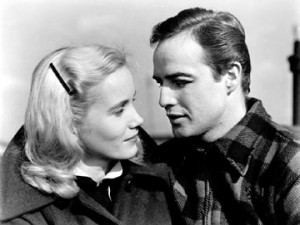 When dockworker Joey Doyle (Ben Wagner), about to testify against Friendly before the Commission, is killed, Joey’s sister, Edie (Eva Marie Saint) gets involved, shaming the local priest Father Barry (Karl Malden) into taking action against the mob-controlled union.
When dockworker Joey Doyle (Ben Wagner), about to testify against Friendly before the Commission, is killed, Joey’s sister, Edie (Eva Marie Saint) gets involved, shaming the local priest Father Barry (Karl Malden) into taking action against the mob-controlled union.
Edie and Father Barry urge Terry to testify, just as another dockworker, Timothy J. “Kayo” Dugan (Pat Henning), who agrees to testify when Father Barry promises support, ends up dead, when he is crushed in a staged accident.
Tormented by his awakening conscience, Terry leans toward testifying, and Friendly decides that Terry must be killed unless Charley can keep him quiet. Charley first tries to bribe Terry, then threatens him with a gun. Placing the blame for his own position in life on his brother, Terry reminds Charley that his career would have bloomed. “I coulda’ been a contender,” laments Terry to his brother, “Instead of a bum, which is what I am. Let’s face it, Charley.” Charley hands Terry a gun, advising him to run, before being murdered himself by Friendly. Father Barry finally persuades Terry to testify.
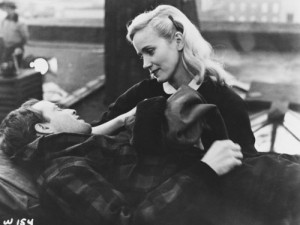 After the testimony, Terry is unemployable on the waterfront. Edie wants to leave the place, but the defiant Terry shows up at the dock for recruitment. When he is the only man not hired, Terry confronts Friendly and the two engage in a brutal brawl. Terry gets the upper hand until Friendly’s thugs beat him. The dockworkers, who witnessed the confrontation, declare their support for Terry. Badly wounded, Terry forces himself to his feet and enters the dock, followed by the longshoremen despite threats from Friendly, who’s dumped into the water.
After the testimony, Terry is unemployable on the waterfront. Edie wants to leave the place, but the defiant Terry shows up at the dock for recruitment. When he is the only man not hired, Terry confronts Friendly and the two engage in a brutal brawl. Terry gets the upper hand until Friendly’s thugs beat him. The dockworkers, who witnessed the confrontation, declare their support for Terry. Badly wounded, Terry forces himself to his feet and enters the dock, followed by the longshoremen despite threats from Friendly, who’s dumped into the water.
Oscar Context
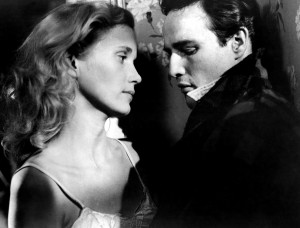 The other Best Picture contenders in 1954 were a court drama based on Herman Wouk’s novel, “The Caine Mutiny,” which starred Humphrey Bogart; Clifford Odets’s stiff backstage melodrama “The Country Girl,” with Bing Crosby, Grace Kelly, and William Holden; MGM’s musical “Seven Brides for Seven Brothers,” starring Jane Powell and Howard Keel; and the romantic comedy “Three Coins in the Fountain,” which did more for the encouragement of American tourism to Rome than for the advancement of film art.
The other Best Picture contenders in 1954 were a court drama based on Herman Wouk’s novel, “The Caine Mutiny,” which starred Humphrey Bogart; Clifford Odets’s stiff backstage melodrama “The Country Girl,” with Bing Crosby, Grace Kelly, and William Holden; MGM’s musical “Seven Brides for Seven Brothers,” starring Jane Powell and Howard Keel; and the romantic comedy “Three Coins in the Fountain,” which did more for the encouragement of American tourism to Rome than for the advancement of film art.
Cast
Terry Malloy (Marlon Brando)
Father Barry (Karl Malden)
Johnny Friendly (Lee J. Cobb)
Charley Mallon (Rod Steiger)
Kayo Dugan (Pat Henning)
Edie Doyle (Eva Marie Saint)
Glover (Leif Erickson)
Big Mac (James Westerfield)
Truck (Tony Galento)
Tillio (Tami Mauriello)
Pop Doyle (John Hamilton)
Mott (Heldabrand)
Moose (Rudy Bond)
Luke (Don Blackman)
Jimmy (Arthur Keegan)
Barney (Abe Simon)
J.P. (Barry Macollum)
Specs (Mike O’Dowd)
Gilette (Marty Balsam)
Slim (Fred Gwynne)
Tommy (Thomas Handley)
Mrs. Collins (Anne Hegira)
Credits
A Sam Spiegel Production, released by Columbia Pictures.
Produced by Sam Spiegel.
Directed by Elia Kazan.
Screenplay by Budd Schulberg, based on articles by Malcolm Johnson.
Photographed by Boris Kaufmann.
Art direction by Richard Day.
Edited by Gene Milford.
Musical score by Leonard Bernstein.
Running time: 108 minutes.










